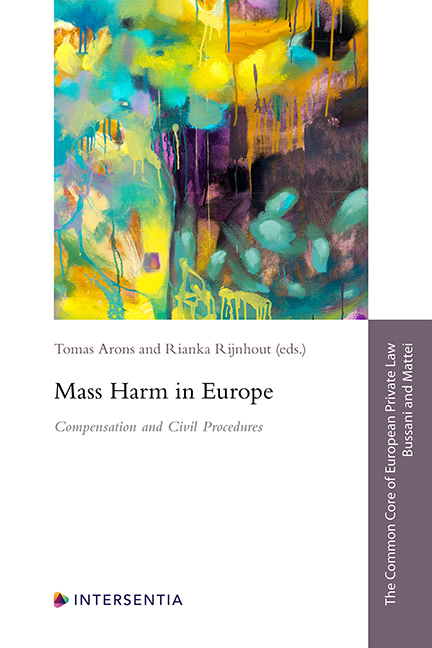Mass Harm in European Private Law: An Introduction
Published online by Cambridge University Press: 03 April 2024
Summary
INTRODUCTION
This Common Core project on mass harm in European private law started in 2019. A number of scholars from this network signalled that mass harm is handled differently in different jurisdictions, both in terms of the application and tenacity of substantive tort law and in terms of procedure. They also signalled that in some cases the solution was sought outside tort law. Moreover, there was a perception that mass harm was handled differently in personal injury, property damage and pure economic loss cases. Finally, there was some movement at the European level.
These academics noted that there was not yet a comparative law project looking for the common core in Europe private law in mass harm cases. In particular, a project with a broad scope, bringing together substantive, procedural and non-tort law aspects, was missing. This Common Core project on mass harm aims to fill this gap. The aim of this project is to understand how substantive tort law responds in mass harm situations. As this response is also largely determined by procedural options for bringing a case, procedural law is also discussed in detail. Because we know that in some mass harm cases, compensation is not or cannot be offered through tort law, and because we realise that civil law is sometimes de facto inaccessible due to the large-scale nature of the damage, we chose to also reflect on the shift in compensation options beyond tort law. In essence, this approach allows us to analyse what factual and legal possibilities and impossibilities exist to receive compensation for mass harm through substantive tort law, and what triggers exist to seek other compensation options. This book is the result of that project and was completed in December 2022.
This first chapter aims to introduce this research project. In section 2 , we will start by presenting the state of the art about compensation for mass harm, and we will focus on the state of the art in terms of procedural aspects and solutions outside tort law. More in-depth analysis and substantive law are covered in the case studies. As no rapporteur from a Scandinavian country participated in this project, we will focus in section 3 on what is known about these systems in mass harm cases.
- Type
- Chapter
- Information
- Mass Harm in EuropeCompensation and Civil Procedures, pp. 3 - 18Publisher: IntersentiaPrint publication year: 2023



